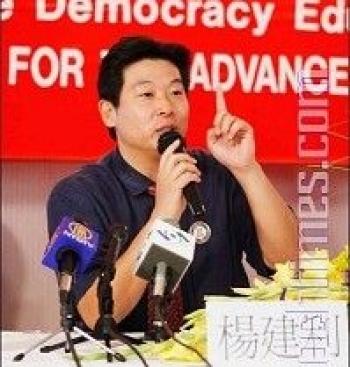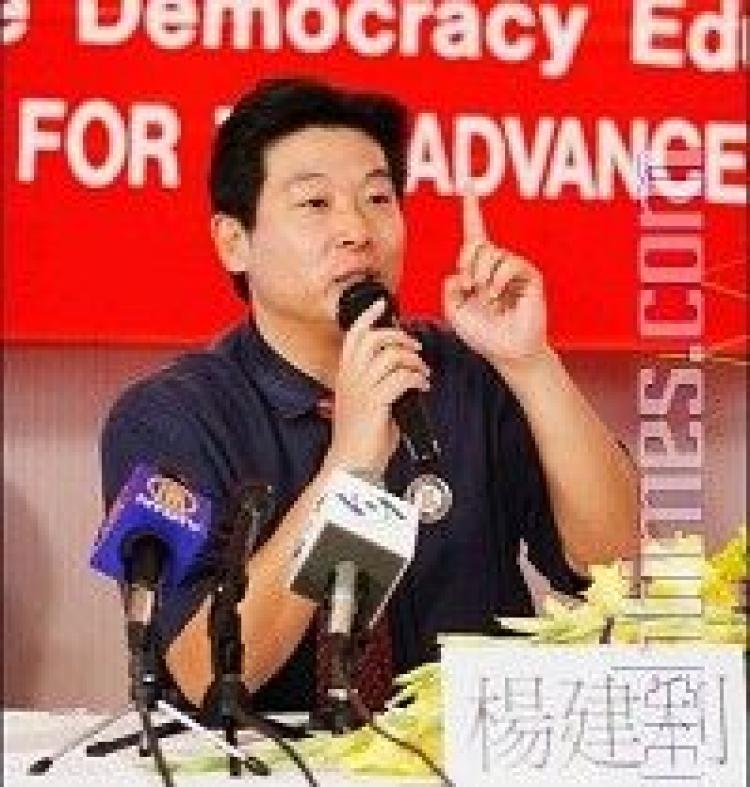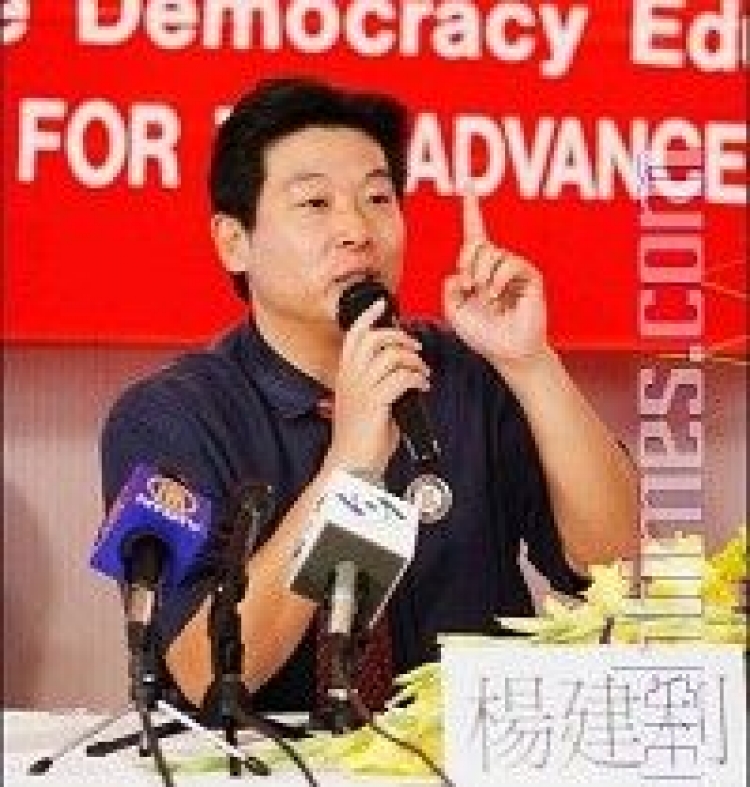At a forum on the 19th anniversary of the June 4 Tiananmen Massacre, held at North Central College, Naperville, Illinois, famous Chinese dissident Yang Jianli gave a speech and took questions from the audience.
Yang was among the Tiananmen Square activists of 1989, and was later jailed for his political activities. He holds a Ph.D in political economy from Harvard University, and a Ph.D. in mathematics from UC Berkeley.
He is currently the President of the Foundation for China in 21st Century, a non-profit think tank working for constitutional democracy in China. He has given expert testimony to the United States Congress and is now a US permanent resident. The following is an excerpt from his question-and-answer session on June 4, 2008.
Question from audience: There seem to be many factions, or groups, of overseas democracy activists. It seems that they have offset each other’s efforts. Dr. Yang, what have you observed in this regard? My second question: how can people in different parts of the world support your effort, the Gongmin Walk (Citizen Walk)?
Yang Jianli: Yes, splits among the pro-democracy groups overseas are indeed a reality. Those of us in the groups need to pay attention to this problem and figure out how to resolve it. But I’ve been in (the movement) for twenty years have not come up with a good solution.
The splits are caused by many different things. One is that reactionary activists are by nature hard to unify—their personalities are quite unique. These people are brave enough to stand up to a regime as brutal as the Chinese government, so often they would not listen to those with differing opinions. This phenomenon does not exist solely within the Chinese pro-democracy activists.
The second reason is that people who have lived in Chinese society, as you all know, have been subjected to the Communist style of education. Since we were little we were taught to tell lies and engage in class struggle. Yesterday I was (being interviewed) on a call-in show on Radio Free Asia. One of the callers mentioned that June 1st is Children’s Day in China. Many children will be tying red handkerchiefs on their necks and swearing allegiance to the Communist Youth League. They'll swear loyalty to the leaders of the Party and to become the future stewardesses of communism.
But these kids don’t know what communism is, what it has brought to humanity, or whether it’s a good thing or a bad thing. But they do know one thing: that there are benefits to taking the oath; at least they know that if they don’t, they will be discriminated against. So growing up in China, we were taught the benefits of telling lies.
Pro-democracy activists not only need to fight against the control of the Chinese Communist Party, but also against the cultural things that communist education has left in our veins. The latter is much harder than the former. It’s like having to remake yourself—it’s extremely difficult. It’s like we often say, we grew up drinking wolves’ milk.
Another reason is that activists sometimes doubt whether there’s a future for the movement. I think we need to take a wider look at the movement. It’s not a moral issue, that activists have to take higher moral ground than the communist party. The key is that our goal—democracy—is consistent with human nature and with the trend of world development. That is where its life force lies.
No matter how many disagreements activists may have, the movement continues forward. When I came out of prison I suddenly found so many pro-democracy activists that I had never heard of before. I am of the earlier generation of activists. I knew all my colleagues’ names, but when I left prison I found myself among fresh faces. Sure, there are many aspects of the movement that are not satisfactory, but because our goal is good, we will find a way to resolve the problems within the movement.
Regarding the Gongmin Power (Citizen Power): Gongmin Power is an experiment of mine and my friends’ to try and unify the movement. I don’t mean to say that all the movement should unite under me. In prison I endlessly pondered about how to organize. The Chinese communist party has “three magic weapons”: party building, rule by force, and unified front.
The Party most fear that we organize. The old way of organizing doesn’t work anymore: establish a party, appoint a chairman. Then this new party discovers that it doesn’t grow; instead it starts to shrink. There’s no capacity for others’ input and it does not allow for others to share your resources. The way the Party taught you to organize—the stuff they put in the textbooks—are false. They didn’t teach you how really to organize.
So Gongmin Power is at once an organization and a concept; whoever agrees with it is a member. I encourage each member to add to the meaning. The key is not in the leader; nobody buys a company’s products because they like their CEO.
Also, the CCP fears that we unify. So they will often say, “Oh this person is especially close with Falun Gong; that person is close with the Dalai Lama.” That is to say that we cannot associate with each other. Please don’t fall into that trap. The best thing we can do overseas is to unite.
All those who fight for human rights—Tibetans, Uighurs, Taiwanese, the people of Hong Kong and Macau, mainland Han Chinese, Christians, Falun Gong practitioners—we must all unite. Then we will have power. Not one person’s success will come before the success of the cause.
Q: The CCP used the Sichuan earthquake as a PR tool, focusing all the media on how tragic the situation is, invoking the word “patriotism” to shield them from criticism on their persecution of various groups. They seem to be using the same tactic overseas. How should we respond?
YJ: That is a good question. Dictatorships have a characteristic: They can mobilize large amounts of resources in a short amount of time. In times of crisis or while undertaking a large construction project, they can show their power very quickly.
Shortly after I got out of prison, news surfaced of slave labor in a brick factory in Shanxi province. A reporter told me that the Chinese government had already issued an order to media: report only on the rescue of victims, not on how the incident came to be. If you look at the footage from the Sichuan earthquake, all you see is that of rescue.
A natural disaster is a natural disaster; I don’t believe that the CCP could have caused that. The number of people they could have saved after the fact cannot be compared with the deaths they could have prevented. The collapse of so many school buildings is the most obvious example. Suppressing earthquake warnings is another.
The CCP has a commonly used media tactic: turn the perpetrators into heroes as quickly as possible. Get as much footage of them and they turn into heroes; everyone should be thankful to them. But the effect is all short-term. Why? After this earthquake we saw some good signs: First, the people mobilized to save themselves and each other.
In past crises, it was always the government who organized help. And some reporters broke through the central authority’s regulations to give a true picture of what happened. We could say that the one good thing that resulted from this tragedy is that citizen-based society is maturing in China.
When the Chinese government sees this phenomenon they take note. They must consider what effect the earthquake has on it. Does it open up the media or not? The CCP does not have an operating creed; it operates different by basis of the situation—it’s very practical.
I'll give you an example: a Chinese professor Guo Quan wrote two articles after the earthquake happened. One is about the government’s suppression of earthquake warnings, and the other asking the government to examine whether the tremors damaged nuclear infrastructure.
Very quickly, he was taken away and held for ten days. After he was released I gave him a call. He said, “They didn’t ask me anything about the articles, but drilled me daily trying to find out who was in my organization.” So that goes to show that the CCP is worried that someone had formed an organization in the wake of the earthquake. On one hand China’s democratic society is maturing; on the other, the CCP is getting anxious.
I have spoken to many American mayors, encouraging them to ask people to donate. And at the same time, we need to exercise our monitoring power as citizens to make sure the Chinese government does not embezzle those donated funds. We know how the Chinese government is. How much of taxpayers’ money do they normally embezzle, not to mention donated funds?
Now I return to your question of nationalism. The CCP’s idea of nationalism is rather strange. It too is an idea that they put to practical use. The communist ideology in its true form is no longer alive. So it’s left a vacuum. The CCP uses nationalism to fill that vacuum. They figure, while it cannot control people, it can influence their thinking.
But the CCP cannot continue to use nationalism indefinitely because their lifeline is the economy, because if their economy is not growing, they lose legitimacy. So they cannot use nationalism too much; if they do, they could jeopardize their relationship with Westerners and thus their economic growth. That is why their policy is at times tight and at times more relaxed; it’s completely utilitarian. This tactic is called government using nationalism.
Another is called folk use of nationalism: when the government tells them to get angry, the people get angry. When the government says stop, they are no longer angry. ‘Oh, the French are so awful,“ the government would say. The people take to the streets. And then the government says, ”We should save our energy to build the state. This anger is destroying our international relationships.” The people cool down.
The third kind of nationalism is genuine nationalism. The people truly want China to be strong and glorious. They sometimes desire human rights and democracy, but as a means to economic prosperity.
The final, and healthiest kind of nationalism is human rights nationalism. These are people who hope that China as a nation will be respected as a result of Chinese people successfully fight to gain personal dignity and the freedom to make use of their potential.
Q: I want to thank you and everyone for coming to this memorial today. I have a friend who was going to come with me, but today he called me three times saying that he really is too scared to attend. He is afraid that the CCP would remember him and prevent him from traveling to China. I told him there’s nothing to worry about but he refused to come. The fear is so strong. What should I do?
YJ: The CCP exercises two types of control: control by fear and control by lies. Fear is very effective. When the guns sound, nobody dares to speak. The fear lies as deep as people’s blood and so broad that it reaches the United States. When I was lecturing at Harvard I talked about three types of fear. When I was done, a Chinese student stood up and said, “I have no fear.” I said, “Alright, good. Are there specific things about the Chinese government that you find unsatisfactory? Let’s critique it together.” He refused.
Clearly he was afraid. But I don’t think this person was lying about not having fear—he himself does not know it; it’s deep in his blood.
When you visit Beijing, you will see that people live seemingly carefree lives, but they know what they can and cannot say. They say they have no fear but they know there’s a line they cannot cross.
This phenomenon does not only exist in Chinese people but in Americans as well. It’s hard to get China scholars to talk—they are very friendly with the CCP because they need to obtain research permission from them. Others need to establish close relationships with Chinese communist officials to get insider information for their books. Or they find prestige in meeting with such officials. I asked one professor why he is afraid to tell the truth about China. He said, “Well we still need to go to China!” Isn’t that fear? Businessmen are afraid that they will lose business in China.
The third type of fear is self-enforced fear. The CCP often does not know how much leeway to give you. So sometimes when you get scared you will draw a boundary for yourself. How do we break through this type of fear? We need brave people and we need to encourage these people. We in the West do not face the threats but we need to support those in China who stand up.
Many, like the human rights lawyer Gao Zhisheng, were criticized for being too extreme. But I don’t think so. I think, you can’t judge people’s actions in the style of political analysts because often these people’s motives are not political, but rather an act of breaking through the fear. Doing so naturally expands the boundaries of freedom. Of course some people want to be more measured in their actions and that’s fine too—it’s all deserving of support.
Here overseas we can push our local representatives to pass some foreign policy that benefits China.
Q: You made a comparison between June 4th and the Sichuan earthquake—that if the outcome of June 4th was that the CCP reformed, the earthquake may have resulted in fewer unnecessary deaths. But I'd like to draw a different relationship between the two events. I remember that after June 4th, everyone was on the students’ side. If you stood out to speak for the CCP you would have been shunned. But today, for example, a student by the name of Wang Qianyuan stood out and said some fair, neutral words. And for that many people threatened her. It seems the CCP has used Tibet and the earthquake to rally more support.
YJ: In recent Chinese history, the two people who knew the characteristics of Chinese people best were Mao Zedong and Deng Xiaoping. Deng Xiaoping knew that a lot of people opposed the government because they did not have alternative means to support themselves. At the time students weren’t allowed to date or wear nice clothes in school. There was no room to operate outside of communist strictures. The pressure was on the government and so the only way to relieve that pressure was through corruption—let the people make money any way they can, as long as they don’t oppose the government.
Since then, the democratic movement took a turn. A lot of our friends left us one by one to join the swelling economic tide.
Also, at the time someone gave the CCP the idea to “buy stability with money.” The idea is that people need to be bought so they don’t say negative things about the government. Since then the salary of professors grew a lot. A professor at a good university in China makes tens or even over a hundred times more than a construction worker. You can’t find that in any other country.
The communist party’s glory is short-lived. Why? It faces several problems: When the world’s focus is no longer on the earthquake, the CCP’s leaders will no longer be interested. Second, it hasn’t changed its administrative system and will surely make mistakes in handling such large amounts of relief funds. Third, nearly 100,000 people have lost their family. Many mothers who have lost their children have organized.
Back in 1989 nobody wanted to overthrow the government. The students were asking for reform, to gain official recognition, to bring to justice some particularly corrupt officials—that’s all—and even that was not met. But now officials have told me that if any change happens, it won’t be a reform; it will be a revolution.







